Challies Recommends: Best New Testament Commentaries (20 vols.)
Digital Logos Edition
This collection also contains the ESV and the Greek New Testament: SBL Edition (SBL) so that you can immediately start studying the Bible alongside some of the most renowned evangelical scholars.
Overview
Upgrade your library of New Testament commentaries with this hand-picked selection of premiere Evangelical and scholarly works as recommended by Tim Challies. Covering the whole New Testament, this collection represents some of the best NT scholarship across key sets including New International Commentary on the New Testament (NICNT), Pillar, New American Commentaries (NAC), International Critical Commentaries (ICC) and New International Greek Testament Commentaries (NIGTC).
These commentaries give verse-by-verse explanations of the text as well as information on background, authorship, date, purpose, structure and theology. Most of the volumes will engage with the Greek text at some level whilst remaining accessible to the informed lay reader, and detailed enough for pastors and students. With this collection, you will be engaging with key Evangelical authors including Gordon Fee, F.F. Bruce, Douglas Moo and I. Howard Marshall.
This title is included in the following collections
You can save when you purchase this product as part of a collection.
Challies Recommends: Best Comm...
$2,235.10$1,549.99

- Hand-picked collection of Evangelical commentaries
- Represents the best of NT commentary sets (NICNT, Pillar, NAC, ICC, NIGTC)
- Covers the entire New Testament
- Leon Morris
- Robert H. Stein
- D.A. Carson
- Gordon Fee
- F.F. Bruce
- I. Howard Marshall
- Douglas J. Moo
- Thomas R. Schreiner
- G.K. Beale
- and more...
- Title: Challies Recommends: Best New Testament Commentaries
- Publishers: Crossway, Eerdmans, B&H, T&T Clark, Lexham Press, P&R Publishing, Society of Biblical Literature (SBL), Faithlife
- Publication Dates: 1968–2016
- Volumes: 20
- Resources: 28
- Pages: 12,980
- Christian Group: Reformed
- Resource Type: Commentaries
- Topic: Biblical Studies
- Format: Digital › Logos Research Edition
- Resource ID: {4D5091FF-DEEC-4828-977A-40F330AB188B}

In the Christian Church the Gospel of Matthew has been considered the most important portrait of Jesus’ life and message. Containing Jesus’ Sermon on the Mount and a uniquely rich collection of parables, among many other things, Matthew has made a major contribution to the church throughout the centuries, and it still has much to say to the church today.
This superb commentary in the Pillar series explores the meaning and relevance of Matthew in an eminently straightforward fashion. Leon Morris writes for readers who use commentaries to discover further what the Bible means. Throughout, he makes clear what he considers to be the meaning of the Greek text that Matthew has bequeathed to the church. A perceptive introduction precedes Morris’s warmhearted verse-by-verse exposition of Matthew, an exposition based on his own literal translation of the text. Now a standard reference work on the Gospel of Matthew, this mature, evangelically oriented commentary will continue to meet the needs of students, pastor, and general readers alike.
Leon Morris (1914–2006) was a leading evangelical New Testament scholar. He received his PhD from the University of Cambridge in England. He was principal of Ridley College in Melbourne, Australia, retiring in 1979. He then served as visiting professor of New Testament at Trinity Evangelical Divinity School.

This volume offers exceptional commentary on Mark that clearly shows the second Gospel—though it was a product of the earliest Christian community—to be both relevant and sorely needed in today’s church.
Written by a biblical scholar who has devoted thirty years to the study of the second Gospel, this commentary aims primarily to interpret the Gospel of Mark according to its theological intentions and purposes, especially as they relate to the life and ministry of Jesus and the call to faith and discipleship. Unique features of James Edwards’s approach include clear descriptions of key terms used by Mark and revealing discussion of the Gospel’s literary features, including Mark’s use of the "sandwich" technique and of imagistic motifs and irony. Edwards also proposes a new paradigm for interpreting the difficult "Little Apocalypse" of chapter 13, and he argues for a new understanding of Mark’s controversial ending.
James R. Edwards is the Bruner-Welch Professor of Theology at Whitworth University. He is a member of the Center of Theological Inquiry in Princeton.
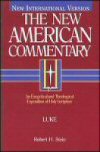
The New American Commentary: Luke
- Author: Robert H. Stein
- Series: The New American Commentary Series (NAC)
- Publisher: Broadman
- Publication Date: 1992
- Pages: 656
Since a commentary is a fundamental tool for the expositor or teacher who seeks to interpret and apply Scripture in the church or classroom, the NAC focuses on communicating the theological structure and content of each biblical book. The writers seek to illuminate both the historical meaning and contemporary significance of Holy Scripture.
In its attempt to make a unique contribution to the Christian community, the NAC focuses on two concerns. First, the commentary emphasizes how each section of a book fits together so that the reader becomes aware of the theological unity of each book and of Scripture as a whole. The writers, however, remain aware of the Bible’s inherently rich variety. Second, the NAC is produced with the conviction that the Bible primarily belongs to the church. We believe that scholarship and the academy provide an indispensable foundation for biblical understanding and the service of Christ, but the editors and authors of this series have attempted to communicate the findings of their research in a manner that will build up the whole body of Christ. Thus, the commentary concentrates on theological exegesis, while providing practical, applicable exposition.
Robert H. Stein (PhD, Princeton Theological Seminary) was most recently senior professor of New Testament interpretation at The Southern Baptist Theological Seminary in Louisville, Kentucky. He previously taught at Bethel Seminary. A world-renowned scholar of the Synoptic Gospels, Stein has published several books, including Luke, A Basic Guide to Interpreting the Bible, Studying the Synoptic Gospels, and Jesus the Messiah.

In this solid evangelical commentary on John’s Gospel, a respected Scripture expositor makes clear the flow of the text, engages a small but representative part of the massive secondary literature on John, shows how the Fourth Gospel contributes to biblical and systematic theology, and offers a consistent exposition of John as a evangelistic Gospel. The comprehensive introduction treats such matters as the authenticity, authorship, purpose, and structure of the Gospel.
D.A. Carson (b. 1946) is one of the most respected New Testament scholars in the world. A respected teacher, author, and speaker, he is currently research professor of New Testament at Trinity Evangelical Divinity School, and the president of The Gospel Coalition. He has served as pastor of Richmond Baptist Church and as the first dean of the seminary of Northwest Baptist Theological College, now known as Northwest Baptist Seminary. Logos has collected his sermons—including audio—in the D.A. Carson Sermon Archive.
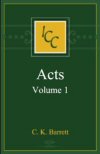
For over one hundred years, the International Critical Commentary series has held a special place among works on the Bible. It has sought to bring together all the relevant aids to exegesis—linguistic and textual no less than archaeological, historical, literary and theological—with a level of comprehension and quality of scholarship unmatched by any other series.
No attempt has been made to secure a uniform theological or critical approach to the biblical text: contributors have been invited for their scholarly distinction, not for their adherence to any one school of thought.
Editors at the Time of Publication: John Adney Emerton, Charles E.B. Cranfield, Graham Norman Stanton
Original Series Editors: Samuel Rolles Driver, Alfred Plummer, Charles Augustus Briggs
The depth of analysis found in the International Critical Commentary (ICC) Series has yet to be surpassed in any commentary collection. One of the best features of this series is the extensive amount of background information given in each volume’s introduction, where all of the analysis is provided before the actual commentary begins. Each volume packs more information into the introduction than you will often find in the body of most commentaries! Also consider that with the electronic versions of each volume, you will never need to leaf through the hundreds of pages in each volume searching for the passage you are studying.
The commentary proper, which is on the Greek text, engages with a wide range of scholarship; readers will find much to argue with and - hesitantly - dissent from, but they will certainly find themselves indebted to its richness and clarity. This is essentially a work for the scholar’s library, and institutions serious about New Testament study will ensure that they have it on their shelves.
—Peter Doble, University of Leeds, Theological Book Review
The discussion of textual variants is careful and detailed. Again and again, Barrett provides valuable insights on the grammar and syntax of Luke’s Greek, and students who read Acts in intermediate or advanced Greek classes will have frequent occasion to bless the author for his help.
—Anvil
C.K. Barrett was the Emeritus Professor of Divinity in Durham University.
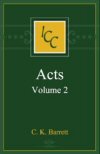
For over one hundred years, the International Critical Commentary series has held a special place among works on the Bible. It has sought to bring together all the relevant aids to exegesis—linguistic and textual no less than archaeological, historical, literary and theological—with a level of comprehension and quality of scholarship unmatched by any other series.
No attempt has been made to secure a uniform theological or critical approach to the biblical text: contributors have been invited for their scholarly distinction, not for their adherence to any one school of thought.
Editors at the Time of Publication: John Adney Emerton, Charles E.B. Cranfield, Graham Norman Stanton
Original Series Editors: Samuel Rolles Driver, Alfred Plummer, Charles Augustus Briggs
The depth of analysis found in the International Critical Commentary (ICC) Series has yet to be surpassed in any commentary collection. One of the best features of this series is the extensive amount of background information given in each volume’s introduction, where all of the analysis is provided before the actual commentary begins. Each volume packs more information into the introduction than you will often find in the body of most commentaries! Also consider that with the electronic versions of each volume, you will never need to leaf through the hundreds of pages in each volume searching for the passage you are studying.
The second volume of this magisterial commentary on Acts covers chapters 15-28. Professor Barrett provides fresh translations, verse-by-verse commentary, and addresses all linguistic, historical and theological issues. This volume also contains the general introduction to the entire commentary - here Barrett considers, for example, the contribution of Acts to the whole history and theology of early Christianity - together with the general index to both volumes. A number of commentaries on the Acts of the Apostles have recently been published, especially in the U.S.; this one ranks among the best given the wealth of information it provides.
—Nouvelle Revue Theologique, July/September 2001
With this second volume, eminent British biblical scholar C. K. Barrett completes his contribution to the prestigious ICC series. As with the first volume published in 1994, Barrett’s commentary on the Greek texts of Acts is thorough and lucid, addressing the literary, historical and theological dimensions of the text. This two-volume work will remain a classic source on Acts for serious students of the New Testament.
—Donald Senior C.P., The Bible Today
The commentary proper, which is on the Greek text, engages with a wide range of scholarship; readers will find much to argue with and - hesitantly - dissent from, but they will certainly find themselves indebted to its richness and clarity. This is essentially a work for the scholar’s library, and institutions serious about New Testament study will ensure that they have it on their shelves.
—Peter Doble, University of Leeds, Theological Book Review
The discussion of textual variants is careful and detailed. Again and again, Barrett provides valuable insights on the grammar and syntax of Luke’s Greek, and students who read Acts in intermediate or advanced Greek classes will have frequent occasion to bless the author for his help.
—Anvil
C.K. Barrett is Emeritus Professor of Divinity in Durham University.

John Murray brings us rich biblical insight, meticulously researched background information, elucidated wisdom, and highly accessible writing in this important work on Romans. The Epistle to the Romans (2 vols.) was a ground-breaking work when first written, and today it is still highly valued for its scholarship. This timeless set is a fantastic addition to the library of any biblical scholar, all pastors, teachers of the Scriptures, and laity. All who wish to glean more from Romans than ever before will find Murray’s volume to be the perfect tool for the study of this Pauline epistle.
Romans is a book well-deserving of the two volumes of commentary given it by Murray, who affords it focused and thought-provoking exegesis. Murray’s words are more accessible than ever in digital format—scriptural cross-references can be accessed easily, the commentary can be linked to your favorite Bible translations, and the Passage Guide provides dozens of search results at the click of a mouse.
. . . the most beautifully written commentary on the planet.
—John Piper, chancellor, Bethlehem College and Seminary
No one is more able or probably likely to succeed John Murray in explaining God’s own glory as the sole cause of redemption.
—Online Reviewer
John Murray, born in 1898, was a Scottish soldier, theologian, and professor. He wrote several important works, including Redemption Accomplished and Applied, Principles of Conduct, and The Imputation of Adam’s Sin. Murray died in 1975.

The New International Commentary on the New Testament: The First Epistle to the Corinthians, Revised Edition
- Author: Gordon D. Fee
- Edition: Revised
- Series: The New International Commentary on the New Testament (NICNT)
- Publisher: Eerdmans
- Publication Date: 2014
- Pages: 1,044
This landmark commentary, originally published in 1987, has been lauded as the best study available of Paul’s theologically rich first letter to the Corinthians. Writing primarily for pastors, teachers, and students, Gordon Fee offers a readable exposition of 1 Corinthians that clearly describes the meaning of Paul’s ideas and their larger theological relevance.
Fee’s revised edition is based on the improved, updated 2011 edition of the NIV, and it takes into account the considerable scholarship on 1 Corinthians over the past twenty-five years. Fee has also eliminated “chapter and verse” language—totally foreign to Paul’s first-century letter—relegating the necessary numbers for “finding things” to parentheses.
An impressively thorough commentary, which offers both judicious comment and useful documentation. . . . It deserves to rank as one of the leading commentaries on 1 Corinthians.
—Anthony C. Thieselton, professor of Christian theology, University of Nottingham
Gordon D. Fee is professor emeritus of New Testament studies at Regent College, Vancouver, British Columbia, and former general editor of the New International Commentary on the New Testament series. His many other books include How to Read the Bible for All Its Worth and God’s Empowering Presence: The Holy Spirit in the Letters of Paul.
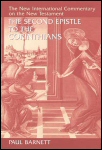
This excellent commentary on 2 Corinthians by Paul Barnett illumines the historical background of the church at Corinth and clarifies the meaning of Paul’s passionate letter both for those first-century Christians and for the church today.
Assuming the unity of the letter, for which extensive argument is offered, Barnett takes the view that Paul is, in particular, addressing the issue of triumphalism in Corinth. This triumphalism is expressed by the newly arrived missionaries who portray Paul as “inferior” to themselves; it is also endemic among the Corinthians. According to Barnett, the recurring theme of the letter is “power-in-weakness,” based on the motif of the Resurrection of the Crucified, which lies at the heart of the Gospel of Christ. Also fundamental to the letter is the theme of fulfillment of the “promises of God” by Christ and the Spirit under the New Covenant.
Written for scholars, pastors, and laypeople alike, this commentary on 2 Corinthians will be a lasting reference work for those interested in this important section of Scripture.
With Logos, the NICNT will integrate into the Passage Guide. Whenever you enter your passage and click go, results from the NICNT will appear on the text you’re studying. This gives you instant access to exactly what you’re looking for—in far less time than it would take you to walk over to the bookshelf and begin flipping through a print volume, let alone find the information you need.
This Pauline letter is rightly regarded by Paul Barnett as a favorite with scholars, having generated a wealth of literary studies in recent times. It also remains an epistle full of problems—historical, textual, and interpretive—for modern readers, especially those who use 2 Corinthians for preaching. Yet it is a rich mine of Gospel truths and a valuable resource for understanding Paul’s teaching on proclamation, ministry, and the Christian life. Barnett is well qualified to handle all these complexities with a sure touch, a scholar’s expertise, and a pastor’s concerns. Above all, he does so with a deft style that makes this new volume accessible to all. A warm welcome awaits this commentary.
—Ralph P. Martin, professor emeritus of New Testament, Fuller Theological Seminary
Barnett has lived with Paul and the Corinthians for a number of years. His well-known expertise as a New Testament historian comes to the fore in his insightful illumination of the historical background to this Pauline epistle. His detailed exegesis in the commentary is clear, rigorous, and sane, and I found his tracing of the rhetorical movement of the arguments through the letter to be invaluable. Readers will also appreciate the helpful distinctions drawn between what was uniquely Pauline and what of Paul stands as a model for pastors, missionaries, and Christians.
—Peter T. O’Brien, head, New Testament Department, Moore Theological College
Paul Barnett is a visiting fellow in ancient history at Macquarie University, and teaches at Moore College in Sydney and Regent College in Vancouver. His other books include The Birth of Christianity: The First Twenty Years.
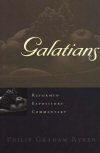
The book of Galatians was written for recovering Pharisees. By trying to base their standing with God on their spiritual performance, the Galatians were in danger of denying the gospel. They needed to hear again the liberating message that we are justified not by observing the law, but by faith in Jesus Christ.
The church today needs to embrace that same gospel message. “We are legalists by nature,” Philip Ryken writes, and Galatians “challenges many of our preconceptions about what it means to have a right relationship with God.”
In the Logos edition, this volume is enhanced by amazing functionality. Important terms link to dictionaries, encyclopedias, and a wealth of other resources in your digital library. Perform powerful searches to find exactly what you’re looking for. Take the discussion with you using tablet and mobile apps. With Logos Bible Software, the most efficient and comprehensive research tools are in one place, so you get the most out of your study.
In an age when scholars write commentaries the size of encyclopedias so that exposition is often drowned in an ocean of background technical details, Dr. Ryken’s Galatians—the first volume in this series—appears as a welcome sign of springtime and the firstfruits of the harvest to come.
—Sinclair Ferguson, senior minister, First Presbyterian Church, Columbia, SC
Phil Ryken is a living refutation of the argument that great expository preaching just can’t be found today. He brings to his pulpit a rare combination of biblical insight, theological substance, and pastoral application. In Galatians, Ryken takes us right into the mind of the apostle Paul and into the heart of this great letter. A richly rewarding and faithful commentary.
—R. Albert Mohler Jr., ninth president, Southern Baptist Theological Seminary
Marvelously exhibits the model of the pastor-scholar. Laypeople will discover a wealth of sound teaching. Even pastors who want to stay abreast of more academic trends in biblical scholarship will appreciate Ryken’s godly common sense and theological wisdom. I warmly recommend this work to pastors and to those who hear them preach.
—Michael S. Horton, J. Gresham Machen Professor, Westminster Seminary, CA
It is uniquely appropriate that this commentary series commences with an exposition of a Pauline letter at the center of recent discussions. Because Ryken rightly understands that Galatians is about justification, and that the problem vexing the Galatians was no mere exclusivism but legalism, his exposition will help many a preacher set forth the gospel of grace.
—J. Ligon Duncan III, senior pastor, First Presbyterian Church, Jackson, MS
Philip Graham Ryken is eighth and current president of Wheaton College and was previously senior minister at Tenth Presbyterian Church, Philadelphia. He has written or edited more than 30 books, including, in this series, 1 Kings, Luke, and 1 Timothy.
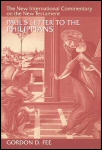
This commentary by respected New Testament scholar Gordon D. Fee is a scholarly yet thoroughly readable study of Paul’s letter to the suffering community of believers in Philippi.
Working directly from the Greek text but basing his comments on the New International Version, Fee sets Paul’s letter to the Philippians squarely within the context of first-century “friendship” and “moral exhortation” to a church facing opposition because of its loyalty to Jesus Christ. At the same time Fee gives equal concern to the letter’s theological and spiritual relevance.
Important features of this commentary include a remarkable comparison of Philippians to two well-known types of letters in the Greco-Roman world: the letter of friendship and the letter of moral exhortation; an introduction that discusses the occasion, authenticity, and theological contributions of Philippians; and scholarly insights that resolve many of the formal and structural issues that have long puzzled New Testament scholars.
With Logos, the NICNT will integrate into the Passage Guide. Whenever you enter your passage and click go, results from the NICNT will appear on the text you’re studying. This gives you instant access to exactly what you’re looking for—in far less time than it would take you to walk over to the bookshelf and begin flipping through a print volume, let alone find the information you need.
This is truly a massive commentary on Philippians—massive in its detailed consideration of introductory matters, massive in its detailed examination of the Greek text, and massive in its exposition of theological matters. Word by word and phrase by phrase, Fee analyzes the argument and distills the theology from what he takes to be Paul’s letter from his Roman imprisonment. He avoids no problem, is guilty of no oversimplifications, is unwilling to impose false clarity where ambiguity is unavoidable, yet through it all he finds the theology of this little gem from the mind of Paul. This is a first-rate commentary, and much will be learned from a careful reading of it.
—Paul J. Achtemeier, professor emeritus of biblical interpretation, Union Theological Seminary
This is an exceedingly important contribution. Fee has become one of the premier commentators on the Pauline letters. Precious few scholars can claim comparable mastery of the whole range of exegetical studies, from the technical details of textual criticism to the broad challenges of theological reflection. Moreover, he combines readable exposition in the text with thorough documentation in the footnotes. A real treasure.
—Moises Silva, emeritus professor, Gordon-Conwell Theological Seminary
Gordon D. Fee is professor emeritus of New Testament studies at Regent College, Vancouver, British Columbia, and former general editor of the New International Commentary on the New Testament series. His many other books include How to Read the Bible for All Its Worth and God’s Empowering Presence: The Holy Spirit in the Letters of Paul.
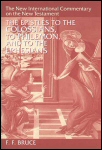
The New International Commentary on the New Testament: The Epistles to the Colossians, to Philemon and to the Ephesians
- Author: F.F. Bruce
- Series: The New International Commentary on the New Testament (NICNT)
- Publisher: Eerdmans
- Publication Date: 1984
- Pages: 470
In this scholarly work, F.F. Bruce gives a section by section commentary on Colossians, Philemon, and Ephesians. Based on an in depth study of the Greek texts, he starts with an introduction that covers the beginnings of the three books and gives particular emphasis to the geography of Asia Minor. Bruce compellingly argues for analyzing these three letters together as he discusses the Jewish community and the theological issues brought out in each book. Bruce’s commentary is a well thought out addition to the series of The New International Commentary on the New Testament
In the Logos editions, these valuable volumes are enhanced by amazing functionality. Scripture citations link directly to English translations, and important terms link to dictionaries, encyclopedias, and a wealth of other resources in your digital library. Perform powerful searches to find exactly what you’re looking for. Take the discussion with you using tablet and mobile apps. With Logos Bible Software, the most efficient and comprehensive research tools are in one place, so you get the most out of your study
F.F. Bruce (1910–1990) was Rylands Professor of Biblical Criticism and Exegesis at the University of Manchester in England. Author of numerous commentaries and other books, he served as general editor of the NICNT series from 1962 to 1990.

In this commentary Gene Green reads Paul’s two letters to the Thessalonians in light of the canon of Scripture and of new knowledge about the first-century world of Thessalonica. This fruitful approach helps illuminate the impact of the gospel on its original readers and, in turn, shows how potent a force it can be for the church and society today.
The book begins with an in-depth study of the Thessalonians themselves—their history, land, socioeconomic conditions, and religious environment. This fascinating discussion gives the necessary context for fully appreciating the circumstances surrounding the founding of the city’s first church and the subsequent struggles of the Thessalonian believers to live out their Christian faith.
The main body of the book provides informed verse-by-verse commentary on 1 & 2 Thessalonians that extracts the fullest possible meaning from these important New Testament texts. As Green’s exposition shows, the Thessalonian scriptures are especially valuable as letters of friendship and for showing Paul’s pastoral concern for the many areas in which the Thessalonians needed guidance. Some of Paul’s purposes are to thank the new believers for their steadfastness amid suffering, to encourage them in their trials, to urge them not to neglect their daily work, and, no less important, to teach them about the future of believers who die before Christ returns. Indeed, the matter of the last things and the second coming of Christ so permeates these texts that they are often called Paul’s eschatological letters.
Filled with new information about ancient society, this commentary will fast become a standard reference work for Bible study. By carefully bridging the biblical and modern worlds, Green shows with clarity and warmth the continuing relevance of 1 & 2 Thessalonians for contemporary readers.
Gene L. Green is Professor of New Testament at Wheaton College and Graduate School. Before coming to Wheaton in 1996, he served for over a decade as Professor of New Testament as well as Academic Dean and Rector of the Seminario ESEPA in San José, Costa Rica.

A Critical and Exegetical Commentary on the Pastoral Epistles
- Authors: I. Howard Marshall and Philip H. Towner
- Series: International Critical Commentary Series (ICC)
- Publisher: T&T Clark
- Publication Date: 2004
- Pages: 869
For over one hundred years, the International Critical Commentary series has held a special place among works on the Bible. It has sought to bring together all the relevant aids to exegesis—linguistic and textual no less than archaeological, historical, literary and theological—with a level of comprehension and quality of scholarship unmatched by any other series.
No attempt has been made to secure a uniform theological or critical approach to the biblical text: contributors have been invited for their scholarly distinction, not for their adherence to any one school of thought.
The editors at the time of publication were John Adney Emerton, Charles E.B. Cranfield, and Graham Norman Stanton. The original series editors were Samuel Rolles Driver, Alfred Plummer, and Charles Augustus Briggs.
The depth of analysis found in the International Critical Commentary (ICC) Series has yet to be surpassed in any commentary collection. One of the best features of this series is the extensive amount of background information given in each volume’s introduction, where all of the analysis is provided before the actual commentary begins. Each volume packs more information into the introduction than you will often find in the body of most commentaries! Also consider that with the electronic versions of each volume, you will never need to leaf through the hundreds of pages in each volume searching for the passage you are studying.
I. Howard Marshall is currently Emeritus Professor of New Testament Exegesis and Honorary Research Professor, University of Aberdeen, in Scotland. Formerly, Chair of the Tyndale Fellowship for Biblical and Theological Research; President of the British New Testament Society and Chair of the Fellowship of European Evangelical Theologians. He holds a DD, from Asbury, a MA, BD, and PhD from the University of Aberdeen, and a BA from Cambridge.

Few books in the New Testament are better known or more often quoted as the Letter of James. Because James is so concise, so intensely practical, and so filled with memorable metaphors and illustrations, it has become one of the two or three most popular New Testament books in the church.
This highly original commentary seeks to make the Letter of James clear and applicable to Christian living today. Interacting with the latest views on James but keeping academic references to a minimum, Douglas Moo first introduces the Letter of James in its historical context and then provides verse-by-verse comments that explain the message of James both to its first readers and to today’s church.
Douglas J. Moo, professor of New Testament, teaches at Wheaton College in Wheaton, Illinois. For over twenty years, his ministry was based at Trinity Evangelical Divinity School in Deerfield, Illinois. His academic interests revolve around the interface of exegesis and theology.
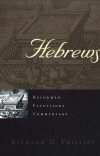
“Few studies can be more profitable to Christians today than that of the Epistle to the Hebrews,” says Richard Phillips. “Written . . . to a group of Jewish Christians facing persecution in the mid-first century AD, the words of this book speak to Christians everywhere about standing firm in Jesus Christ.”
Hebrews captures the challenges and pitfalls of people throughout the ages and shows both why and how to press on in the faith. Its message of warning and hope centers on the surpassing supremacy of Jesus, seen often from the vantage point of the Old Testament.
Richard Phillips’ Hebrews is faithful to the text, cordially committed to confessional Reformed orthodoxy, and alert to practical implications for the life of the church. Phillips keeps the focus where it is for the writer of Hebrews: on God’s ‘last days’ speaking ‘in his Son.’ This volume, which can be read with profit by a wide audience, should serve to remedy the relative neglect of this important New Testament book in the proclamation and life of the churches of the Reformation. Along with the other volumes in this series, this commentary should contribute to preaching and teaching that more fully echo the whole counsel of God.
—Richard B. Gaffin Jr., professor of biblical and systematic theology, Westminster Theological Seminary, Philadelphia
The first liturgical reform of the Protestant Reformation was the implementation of lectio continua expository preaching in Zurich in 1519. Sequential Bible exposition has been a hallmark of Reformed Protestantism ever since. . . . Richard D. Phillips is among the most gifted young preachers of our day. In his hands, Hebrews receives the kind of careful, scholarly, contemporary, and practical exposition that is so desperately needed today.
—Terry Johnson, pastor, Independent Presbyterian Church, Savannah, GA
Hebrews emphasizes that God still speaks about Christ and his people through his written Word. Phillips’ expository addresses ring with that authenticity, whether by way of admonition or assurance.
—Hywel R. Jones, professor of practical theology, Westminster Seminary, California
Richard D. Phillips is the senior minister of Second Presbyterian Church in Greenville, SC. He is a council member of the Alliance of Confessing Evangelicals and chairman of the Philadelphia Conference on Reformed Theology.
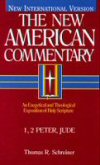
New American Commentary: 1 & 2 Peter and Jude
- Author: Thomas R. Schreiner
- Series: New American Commentary (NAC)
- Publisher: B&H
- Publication Date: 2003
- Pages: 400
Since a commentary is a fundamental tool for the expositor or teacher who seeks to interpret and apply Scripture in the church or classroom, the NAC focuses on communicating the theological structure and content of each biblical book. The writers seek to illuminate both the historical meaning and contemporary significance of Holy Scripture.
In its attempt to make a unique contribution to the Christian community, the NAC focuses on two concerns. First, the commentary emphasizes how each section of a book fits together so that the reader becomes aware of the theological unity of each book and of Scripture as a whole. The writers, however, remain aware of the Bible’s inherently rich variety. Second, the NAC is produced with the conviction that the Bible primarily belongs to the church. We believe that scholarship and the academy provide an indispensable foundation for biblical understanding and the service of Christ, but the editors and authors of this series have attempted to communicate the findings of their research in a manner that will build up the whole body of Christ. Thus, the commentary concentrates on theological exegesis, while providing practical, applicable exposition.
Dr. Thomas R. Schreiner, an articulate, prolific, and highly respected biblical scholar and theologian, guides the reader carefully through these practical yet profound epistles. The two letters of Peter and the epistle of Jude remind us that God’s grace in Christ makes a difference in the way believers live. We were chosen not only for salvation but also for obedience. Too often our churches suffer from moral breakdown and a false view of tolerance. Christians often avoid any word of criticism or judgment because they fear that strong words compromise love. We learn from these epistles that love manifests itself in godly living and that right doctrine must be matched by Christlike lives. The Holy One calls us to be holy as well.
The New American Commentary is for those who have been seeking a commentary that honors the Scriptures, represents the finest in contemporary evangelical scholarship, and lends itself to the practical work of preaching and teaching. This series serves as a minister’s friend and a student’s guide.
The New American Commentary assumes the inerrancy of Scripture, focuses on the intrinsic theological and exegetical concerns of each biblical book, and engages the range of issues raises in contemporary biblical scholarship. Drawing on the skills of over forty scholars and encompassing forty volumes, the NAC brings together scholarship and piety to produce a tool that enhances and supports the life of the church.
Thomas R. Schreiner (PhD, Fuller Theological Seminary) is James Buchanan Harrison Professor of New Testament Interpretation at Southern Baptist Theological Seminary in Louisville, Kentucky. He also taught at both Bethel Theological Seminary and Azusa Pacific University.

Filling a notable gap in scholarship on 2 Peter and Jude, Peter Davids artfully unpacks these two neglected but fascinating epistles that deal with the confrontation between the Greco-Roman world and the burgeoning first-century Jesus communities. Davids firmly grasps the overall structure of these oft-maligned epistles and presents a strong case for 2 Peter and Jude as coherent, consistent documents. Marked by exceptional exegesis and sharp, independent judgments, Davids’ work both connects with the latest scholarship and transforms scholarly insights into helpful conclusions benefiting Christian believers.
In this well-written and informative commentary on 2 Peter and Jude, Peter Davids helps us read these two fascinating letters in light of their Jewish background. He uses his exegetical skill and knowledge of Judaism to provide satisfying explanations of ‘slandering celestial beings’ and the many other difficult-to-understand passages. This outstanding commentary is clearly a ‘top pick’ on these two letters.
—Clinton E. Arnold, Talbot School of Theology, Biola University
A reliable and literate work—knowledgeable without being cluttered, informed without being pedantic. As a traditional commentary, it argues introductory matters well, relies on epistolary and rhetorical insights for structural guides, and is very well informed on Israelite and Greco-Roman background.... Balances the big canvas with smaller cameo scenes.... Should be considered the best of a new wave of commentaries on Jude and 2 Peter.
—Jerome Neyrey, University of Notre Dame
This is an exemplary commentary, marked by the author’s mature scholarship, keen theological insights, and deep pastoral concerns. His thorough exegesis, conducted with a singular combination of rhetorical and narrative analysis as well as other usual critical methods, has produced a most reliable exposition of these neglected epistles.
—Seyoon Kim, Fuller Theological Seminary
A careful and painstaking treatment of the least well known of the General Epistles… The reader’s curiosity is both stimulated and satisfied by this commentary. It will fill a niche in today’s market and be a welcome addition to the libraries of both scholars and pastors. I commend it with enthusiasm.
—Ralph P. Martin, Fuller Theological Seminary
Peter H. Davids is professor of biblical theology at St. Stephen’s University, St. Stephen, New Brunswick. He is also the coeditor of Dictionary of the Later New Testament and Its Developments.

This Pillar commentary seeks to clearly explain the meaning of John’s letters to teachers, pastors, and general readers looking for a reliable resource for personal study. Colin Kruse introduces the important issues involved in interpreting the Johannine letters, gives verse-by-verse comments, and provides extensive discussion of John’s major theological themes, including the real humanity of Christ, atonement, the role of the Spirit, Christian assurance, the meaning of koinonia, Christian love, and eternal life.
Designed both for serious students and for general readers of the Bible, the Pillar New Testament Commentary volumes seek to make clear the meaning of the text of Scripture as we have it. The scholars writing these volumes interact with the most important, informed contemporary debate yet avoid undue technical detail. Their ideal is a blend of rigorous exegesis and exposition, scholarship and pastoral sensitivity, with an eye alert both to biblical theology and to the contemporary relevance of the Bible.
Colin G. Kruse is lecturer in New Testament, Bible College of Victoria, Melbourne.

The Book of Revelation: New International Greek Testament Commentary
- Author: G.K. Beale
- Series: New International Greek Testament Commentary (NIGTC)
- Publisher: Eerdmans
- Publication Date: 1999
- Pages: 1,309
This commentary series is established on the presupposition that the theological character of the New Testament documents calls for exegesis that is sensitive to theological themes as well as to the details of the historical, linguistic, and textual context. Such thorough exegetical work lies at the heart of these volumes, which contain detailed verse-by-verse commentary preceded by general comments on each section and subsection of the text.
An important aim of the NIGTC authors is to interact with the wealth of significant New Testament research published in recent articles and monographs. In this connection the authors make their own scholarly contributions to the ongoing study of the biblical text.
The text on which these commentaries are based is the UBS Greek New Testament, edited by Kurt Aland and others. While engaging the major questions of text and interpretation at a scholarly level, the authors keep in mind the needs of the beginning student of Greek as well as the pastor or layperson who may have studied the language at some time but does not now use it on a regular basis.
This monumental new study of the book of Revelation will be especially helpful to scholars, pastors, students, and others seriously interested in interpreting the Apocalypse for the benefit of the church. Too often Revelation is viewed as a book only about the future. As G.K. Beale shows, however, Revelation is not merely a futurology but a book about how the church should live for the glory of God throughout the ages—including our own.
Engaging important questions concerning the interpretation of Revelation in scholarship today, as well interacting with the various viewpoints scholars hold on these issues, Beale’s work makes a major contribution in the much-debated area of how the Old Testament is used in the Apocalypse. Approaching Revelation in terms of its own historical background and literary character, Beale argues convincingly that John’s use of Old Testament allusions—and the way the Jewish exegetical tradition interpreted these same allusions—provides the key for unlocking the meaning of Revelation’s many obscure metaphors. In the course of Beale’s careful verse-by-verse exegesis, which also untangles the logical flow of John’s thought as it develops from chapter to chapter, it becomes clear that Revelation’s challenging pictures are best understood net by apparent technological and contemporary parallels in the twentieth century but by Old Testament and Jewish parallels from the distant past.
This is an incredibly learned study, a magisterial commentary on one of the most difficult hooks in the Bible. There has never been a deeper probing of the Old Testament allusions in the Apocalypse, nor a better presentation of the idealist interpretation. This work will he essential for all scholars and students of the book of Revelation for years to come.
—Grant Osborne, Trinity Evangelical Divinity School
This volume will undoubtedly take its place as a standard work to be considered in responsible study of Revelation.
—M. Eugene Boring, Brite Divinity School, Texas Christian University
This long-awaited commentary is a magnificent achievement and will be an invaluable guide and resource for all future study of Revelation. Beale’s particular emphasis on interpreting the text by reference to the Old Testament Scriptures and Jewish exegetical traditions is one that the text itself invites, while the orientation to theological reflection is also very welcome in a commentary on this profoundly theological text.
—Richard Baukham, University of St. Andrews
Beale has an unrivaled knowledge of Revelation and its Jewish background. His work will be invaluable both to scholars and students who want a thorough treatment of the textual and critical problems and to pastors and laypeople who want to know what Revelation meant—and means—in its own terms.
—J.P.M. Sweet, Cambridge University
G.K. Beale is the Kenneth T. Wessner Chair of Biblical Studies at Wheaton College Graduate School. He is also the editor of The Right Doctrine from the Wrong Text? Essays on the Use of the Old Testament in the New and the author of The Use of Daniel in Jewish Apocalyptic Literature and in the Revelation of St. John and John’s Use of the Old Testament in Revelation.
Reviews
6 ratings

Stephanus Karnadhi
10/11/2021
Better check logos.com/guides for best resources on individual book of the BibleHenry Harris
6/23/2021
A handful of great commentaries and a lot of mediocracy. My rec: do your own homework. Finding the best of the best is hard work, and different people will have different favorites, but this set has a lot of head-scratchers. Logos should hire me to improve it, LOL. We'll start by replacing Morris w/ Carson for Matthew.
Ryan Whitaker
2/23/2020

Eddie Teague
11/5/2019
Ryan Hogshooter
8/29/2018

Danny Castiglione
1/30/2018